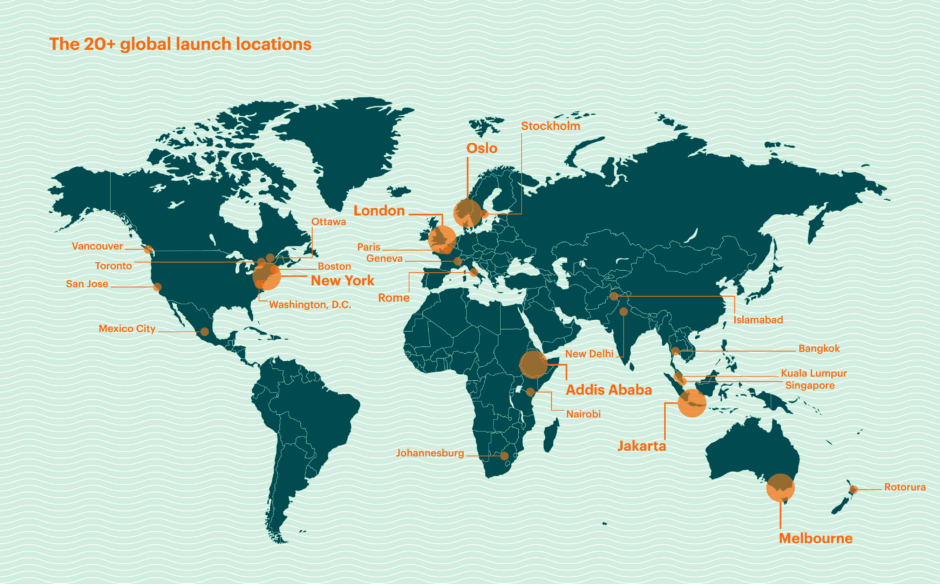Food in the Anthropocene: The EAT–Lancet Commission on healthy diets from sustainable food systems report
The EAT-Lancet Commission on Food, Planet, Health brings together more than 30 world-leading scientists from across the globe to reach a scientific consensus that defines a healthy and sustainable diet Food systems have the potential to nurture human health and support environmental sustainability, however our current trajectories…
The EAT-Lancet Commission on Food, Planet, Health brings together more than 30 world-leading scientists from across the globe to reach a scientific consensus that defines a healthy and sustainable diet
 Food systems have the potential to nurture human health and support environmental sustainability, however our current trajectories threaten both. The EAT–Lancet Commission addresses the need to feed a growing global population a healthy diet while also defining sustainable food systems that will minimise damage to our planet.
Food systems have the potential to nurture human health and support environmental sustainability, however our current trajectories threaten both. The EAT–Lancet Commission addresses the need to feed a growing global population a healthy diet while also defining sustainable food systems that will minimise damage to our planet.
The Commission quantitively describes a universal healthy reference diet, based on an increase in consumption of healthy foods (such as vegetables, fruits, whole grains, legumes, and nuts), and a decrease in consumption of unhealthy foods (such as red meat, sugar, and refined grains) that would provide major health benefits, and also increase the likelihood of attainment of the Sustainable Development Goals. This is set against the backdrop of defined scientific boundaries that would ensure a safe operating space within six Earth systems, towards sustaining a healthy planet.
The EAT-Lancet Commission publishes scientific targets to guide an urgent transformation in the way that we eat and produce food to deliver a sustainable food system for people and planet. Written by 37 experts in health, environmental sustainability, food systems, economics and political governance, the report’s key takeaway is that it’s possible to feed the world’s growing population a sustainable, healthy diet without further harming the planet but it will require significant change.
With 3 billion people malnourished globally and a food production system damaging the planet, the release of the EAT-Lancet Commission on Healthy Diets from Sustainable Food Systems couldn’t be more timely. The good news? A transformation of global eating habits, improved food production systems and a reduction in food waste can deliver healthy and sustainable diets for a population of 10 billion people by 2050.
The findings: on the plate
 The report outlines what a sustainable diet looks like– a diet that is predominantly plant-based with low amounts of animal-based foods, refined grains, highly processed foods or added sugars. To deliver this, the global consumption of foods such as red meat and sugar will need to decrease by 50% while consumption of nuts, fruits, vegetables and legumes must double.
The report outlines what a sustainable diet looks like– a diet that is predominantly plant-based with low amounts of animal-based foods, refined grains, highly processed foods or added sugars. To deliver this, the global consumption of foods such as red meat and sugar will need to decrease by 50% while consumption of nuts, fruits, vegetables and legumes must double.
The intake ranges in the above table aims to account for variations in food types, agricultural systems, cultural traditions, and individual dietary preferences i.e. vegetarian or vegan diets.
Although designed as global targets, these scientific targets will vary at a local level to account for the eating habits, food production systems and waste production of each country. Countries in North America, for example, eat almost 6.5 times the recommended amount of red meat whereas countries in South Asia eat only half of the recommended amount. As such, the action required by these countries to deliver healthy diets from a sustainable food production system will differ.
 The above recommendations deliver on both nutrition and environmental sustainability. For nutrition, the detailed dietary pattern would improve the intake of most nutrients and micronutrients. At the same time, this food production system required to support a healthy diet can occur within planetary boundaries in terms of land use, nutrients, freshwater, biodiversity loss and climate change—and can be sustainably intensified to feed the world’s growing population.
The above recommendations deliver on both nutrition and environmental sustainability. For nutrition, the detailed dietary pattern would improve the intake of most nutrients and micronutrients. At the same time, this food production system required to support a healthy diet can occur within planetary boundaries in terms of land use, nutrients, freshwater, biodiversity loss and climate change—and can be sustainably intensified to feed the world’s growing population.
Relevant Resources
• Food in the Anthropocene: the EAT–Lancet Commission on healthy diets from sustainable food systems – English (PDF)
• Report Summary – English | Français | Español | Arabic | Russian
• Watch the launch in Oslo, Norway – Facebook LIVE
• The updated list of Worldwide Launches
• EAT-Lancet Commission: Food, Planet, Health – SDG2 Advocacy Hub
Worldwide launches of the EAT-Lancet report
